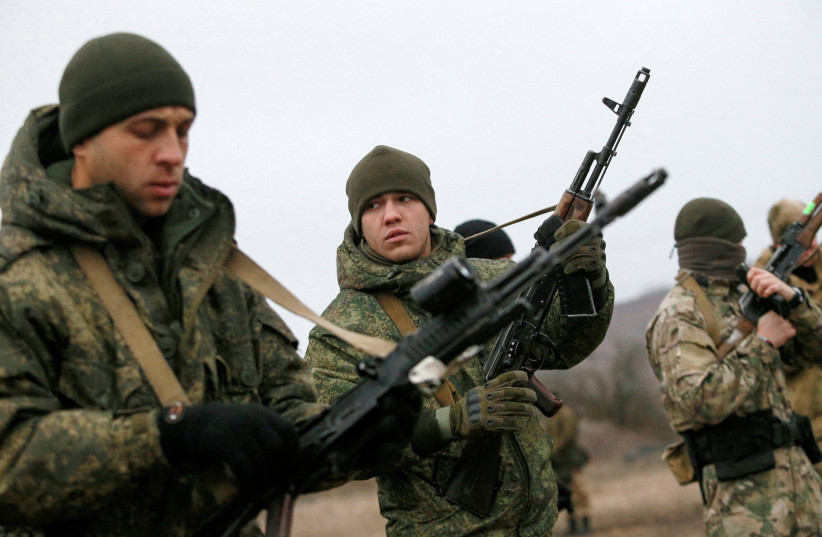After a televised detailing of his grievances with Ukraine and the West, Vladimir Putin announced Russia’s recognition of the breakaway Ukrainian regions of Donetsk and Luhansk. He then ordered the Russian military to cross the border and embark on peacekeeping operations. War between Russia and Ukraine appears to be looming.
I’ve been watching the drama unfold from perspectives as a former American diplomat and as a Jewish refugee from former-Soviet Ukraine. Wearing my State Department hat, I see the situation clearly. Putin, still sour from the breakup of the Soviet Union, has manufactured a crisis as a pretext for invading Ukraine.
One of Putin’s grievances is the abandonment of Russia by former-Eastern Bloc countries that have chosen to join NATO after the dissolution of the USSR. Putin is intent on preventing an independent Ukraine from following in their footsteps.
As well, the proximity of the expanded post-Cold War NATO is making Putin paranoid. He recently accused the Transatlantic Alliance of coming with its missiles to our doorstep, forgetting that it’s the Soviet expansion, now embodied by Putin’s Russia that caused his neighbors to seek a security blanket from the West.
However, the main driver of Putin’s aggression toward Ukraine is his belief that Russians and Ukrainians are one people, a single whole. Putin has long lamented the gradual dismemberment of Greater Russia at the hands of Poles, Austro-Hungarians, Romanians, Lithuanians and even Bolsheviks. Putin believes that Russia was robbed and he intends to recapture what’s rightfully hers. He started with Crimea in 2014. Now, he is poised to go further.

That kind of thinking is reminiscent of several other megalomaniacs’ excuses for aggression in the last century. We know how it ends and must do everything possible to ensure Putin fails. Sanctions on Russia’s metals sector, controlled by pro-Putin oligarchs, would be a good start. That’s my professional assessment.
However, I’m also looking at Ukraine through a personal lens of a Ukrainian Jew, and Jews have a complicated history in Ukraine.
I grew up in Chernivtsi, a picturesque city in southwestern Ukraine, near the Romanian border. Its cobble-stone streets and Gothic architecture (at least the pre-Soviet kind) gave the city an old European charm. I enjoyed strolling with my parents on pedestrian-only Kobylianska Street, hopping on the tramvai (tram) to visit my friends across town, and drinking a fermented drink called kvas with my dad - still do. What I didn’t enjoy was the pervasive antisemitism in Ukraine.
Over a period of 300 years, Ukrainian heroes, such as Bogdan Chmielnicki, Symon Petliura and Stepan Bandera – still celebrated in Ukraine to this day – wiped out nearly 200,000 Jews. Thousands of pogroms, anti-Jewish massacres in the early 1900s, resulted in the rape and murder of tens of thousands of Jews. Prior to the German invasion in 1941, Ukraine had the largest Jewish population in Europe. Then, within a span of four years, at least one and a half million Jews were killed on Ukrainian soil. One of the worst atrocities took place just outside of Kyiv in Babi Yar, where 33,771 Jews were rounded up and shot over just two days in 1941.
Certainly, the Nazis bear the main responsibility for the antisemitic atrocities during the Holocaust, but the truth is many Ukrainian collaborators helped. My grandparents, who were hoarded into ghettos and concentration camps, and barely survived the Holocaust, recalled the delight they witnessed from Ukrainian guards in assisting the Einsatzgruppen killing units in liquidating Jews.
My own experience with antisemitism in Ukraine was the mundane variety of the Soviet era. It was not uncommon for me to be called a zhid (kike) in the schoolyard. My legal papers identified my nationality as Evrei (Jew), not Ukrainian like my peers. Every so often, I overheard my parents, grandparents or their friends whisper about some antisemitic incident they had to deal with. Eventually, my dad’s professional demotion, because he was Jewish, became the final straw that sent us packing to the United States.
To be fair, incidents of antisemitism in Ukraine have been steadily declining since we left. According to Pew surveys in 2018 and 2019, only 5% of Ukrainians preferred not to have Jews as fellow citizens and 83% had a favorable opinion of Jews – better than any other Eastern and Central European country. The Ukrainian government has criminalized antisemitism and in 2019, the Ukrainian people elected a Jewish president, Volodymyr Zelensky, who is now center stage of the biggest drama on the European continent since the fall of the Soviet empire.
As Russian troops cross the Ukrainian border, I try to reconcile my professional instincts with my personal feelings. Should I care if one country with a legacy of antisemitism attacks another? A good friend pointed to our Jewish tradition that Jews believe that all life is sacred.
That’s what the Russian invasion is about: Human life. Vladimir Putin is breaking into a sovereign country, again, and endangering the lives of Ukrainian men, women and children. Despite my unease with Ukraine’s past, I stand with Ukrainians today.
The people of Ukraine, all created in God’s image, have a moral right to defend themselves and the rest of us, who care about right and wrong, have an obligation to help them. That’s my view as a former American diplomat and as a Jewish refugee from former-Soviet Ukraine.
The writer is a former US deputy assistant secretary of state.
